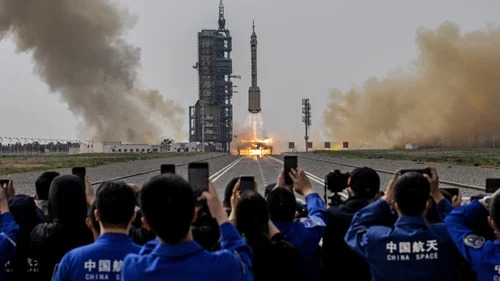China’s ambitious space exploration program reached another milestone as a new crew of three astronauts blasted off on their way to the Tiangong space station – aka the “Sky Palace” and the country’s first long-term space station. The Long March-2F rocket successfully launched the Shenzhou 16 crew spacecraft from the Jiuquan Satellite Launch Center on Monday, May 29. The launch of the Shenzhou 16 crew spacecraft marks another step forward in humanity’s collective endeavor to explore and understand the wider universe.
According to state media, the successful launch is part of its crew rotation, and marks the fifth manned mission to the Chinese space station in the past two years. The launch occurred at 9:31 PM EDT, which the China National Space Administration hailed as “a complete success.” The separation of the spacecraft – the Shenzhou-16 or “Divine Vessel” – from the Long March-2F rocket occurred around 10 minutes into the launch.
Currently, the Tiangong space station comprises of three modules, and was completed at the end of the previous year after 11 crewed and uncrewed missions since April 2021. A three-member crew – consisting of mission commander Fei Junlong and crewmates Deng Qingming and Zhang Lu – manned the space station since they arrived in late November, and now, they will be replaced by the crew of the Shenzhou-16 spacecraft. The Shenzhou-17 mission is expected to launch in October.
Similar to the International Space Station (ISS), which serves as a symbol of international collaboration, the Tiangong space station represents China’s aspirations to establish a sustained presence in space. According to media reports, the next module slated to dock with the space station will expand it from its current T-shape to a cross-shaped structure. China plans to keep the orbital outpost a solid presence in space, keeping it permanently occupied for at least a decade.
Speaking of the crew of the Shenzhou-16, the mission is led by Jing Haipeng, a veteran astronaut and a senior spacecraft pilot from China’s first batch of astronaut trainees in the late 1990s. He has led two previous trips as the mission commander, and was part of the Shenzhou 7, 9 and 11 missions.
Joining Haipeng are Zhu Yangzhu and Gui Haichao, both part of the third batch of astronauts of the Asian country and who are venturing into space for the first time. Zhu, a former professor at a military university, will serve as the spaceflight engineer and operate and manage the spacecraft alongside Haipeng. Gui, a professor at Beihang University, will serve as the payload specialist on the mission and be in charge of managing science experiments at the space station, according to a statement by the China Manned Space Agency (CMSA) in a press conference on Monday.
“It is a great honor for me to serve as the commander for the third time. This time, I am mainly responsible for organization and coordination, including space-Earth communication and mission command,” Jing said at the press conference. “In particular, I have to ensure the safety of the mission and our crew.”
